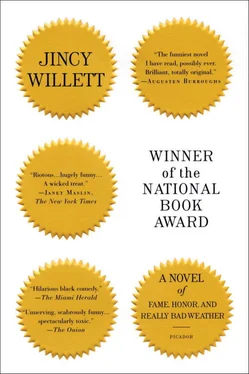This ought to last for thirty minutes.
After that, depression, nausea, disgust. The basement will flood, ruining the bottom shelves of the children’s books and stinking up the whole building for weeks, and I’ll be down there slogging through rank water rescuing what I can, with a pounding skull and a lucid wish to die.
And Pandora! The promised apocalypse! Well, Pandora will send regrets, the sadistic bitch. Pandora’s just tasting us, like Mother’s lightning. Pandora will spin away laughing, leaving all of us, even me, especially secretly me, red-faced at having been duped yet again. There will be a big mess to clean up, that’s all. No one will die. No great big thing will be destroyed. Lives will not be blasted. Heads will not roll. Come the new dawn, the cleansing, life-renewing dawn, here we’ll be, every one of us in his assigned seat, eyes averted, smiles inappropriate, thumbs up our butts. Oh, hell.
—for Guy DeVilbiss
husband, genius, admirer of women, in whose robust imagination I dwell secure, and who could not imagine me ever failing
—Hilda
&$
—for Dorcas
who knows
and won’t tell
—Abigail
Chapter One
An Ordinary Birth

Chapter 1
An Extraordinary Birth
Abigail Mather was special from the very beginning.
A fraternal twin, she had her birthday all to herself. Abigail was born, to Mathilda Wallace Mather, in the Providence Lying-In Hospital, on the thirty-first day of December, 1938. Six hours later, in the New Year, her twin, Dorcas, was born. Doctors and nurses exclaimed over this phenomenon, which had never before happened in the history of the hospital.
—————
Here’s oral history for you. Here’s folk tradition. Hilda obviously didn’t bother with any pesky, prosaic research. Why go down to the actual hospital and rifle through moldy files when you can get it from the horse’s mouth?
Well, our filly has a convenient memory. We got this story, about the two distinct birth dates and being a legend in our own time, from Mother. Mother lived in a magical world, where the unbearable was blinked away even if it was ululating and pointing and hopping up and down in front of you, and the past was always rosier than actual experience. There was nothing wrong with Mother’s mind, or her intellect, either. She was just, like her first daughter, remarkably good at fantasizing.
Abigail and I were born within fifteen minutes of each other on the last day of 1938. It says so on the certificates. We learned this, at the age of twenty, after having bragged for years about our unusual debut. I suspect the story started with Mother amusing herself, in a relatively innocent way, with alternate, more exciting versions of the great event, imagining different ways it could have happened, eventually hitting on this one, the most dramatic. After that it was a simple trick for Mother to forget that the story wasn’t true.
Doctors and nurses did not “exclaim” over you, Mother. I wish for your sake they had. You never did get enough attention in this world. You weren’t as good at it as some.
There was, in fact, something rather special about our birth, but it won’t be reported in In the Driver’s Seat . Abigail came first all right, and she was a breech. They had to knock Mother out, so intense was her prolonged agony, and rummage around inside her like a cow, but no matter how often or how firmly they turned Abigail, she wiggled herself back into her preferred position.
Ass first. That’s how she finally came out. My sister mooned the world for two hours while, behind her, I choked for air and sustenance. My sister blocked the light with her pinchable, Rubenesque behind while I groped, disoriented and blind, for the exit. All I wanted was to breathe and see. Just let me live.
My sister emerged with a list of complicated, interdependent demands. They pried her loose, with infinite patience, a pair of strong, hairy, male hands gently cupping her loins and hindquarters, pulling, releasing, in a pleasing tidal rhythm. When they got her out she held her breath, deliberately I have no doubt, so that they held her upside down and spanked her and generally made such a fuss that when I, the afterthought, emerged (on my hands and knees, I picture it, like an old ragbag crawling across a cartoon desert), I was given only cursory attention. And they told Mother, who briefly fought her way through the ether to get the vital stats, that she had a child of either sex: “A beautiful little girl”—holding Tubbo aloft like the Wimbledon Cup—“and a boy”—smiling in a kindly, commiserating sort of way, giving her just a glimpse of my homely little face, swaddling me like a hideous burn victim.
I was not a remarkably homely child. It was just the comparison. All things being relative .
This story, the one about my being a boy for the first half hour of my life, is probably true, unlike the other old wheeze. Mother told it often, but not with cruelty, and certainly not to aggrandize herself. Years later she was still outraged about their carelessness. “I don’t want a boy,” she had told them. “Now, now,” they said. “I do not want a boy, and I have not made a boy, and that’s all there is to that.” The doctors, unwrapping me to prove their point, stared at her, she said, as though she were a witch and had changed my sex after the fact.
Mother favored Abigail in character, and me in sympathy. Mother admired me. That was nice.
Chapter Two
Unadulterated Yankee Crap
Hilda had two basic organizational choices open to her with respect to chronological events, both real and imagined. She could simply start at the beginning, wherever she decided that was—the Garden of Eden, say—and go through to the end. No one does that anymore. It’s unfashionable.
Or she could take the low road, beginning with Abigail’s “savage act of assertive self-realization” and then segueing back to the Garden, or whatever. I think this is what she should have done, considering the vulgarity of her subject. So we could open with the killing itself. Something like
February 13, 1979. The Eve of Valentine’s Day. Chopmist Hill, Rhode Island, on Route 6, east of the 102 intersection. Moonless night. 11:30 p.m. Conditions: snowing lightly, temperature barely 32º.
No one happening to spot the ancient ’56 Plymouth plowing west at a sedate pace could have guessed that inside a man and woman were playing out a primal struggle for survival which could only end in death for one of them. Emotionally the temperature inside the car was 211 and climbing.
The woman was softly crying, her gentle, defenseless body shaking. Somehow she had enraged him. Somehow she had set him off again. If only she could understand how. Maybe, she thought, if we get home in one piece, he’ll go right to sleep. Dear God, let him sleep. The man’s right hand left the steering wheel and backhanded her savagely, without warning, across the face. “I’m going to kill you, Abigail,” he said, in a terrifying new voice, a low silky purr. “I’m finally going to kill you.”
—————
And so on. Nice and junky. And then, after… again and again, forward, reverse, forward, reverse, and all the time screaming, with every sickening thump, “No more! No more!” …we could cut to the beatific birth, and all the attendant ironic contrast.
Читать дальше













